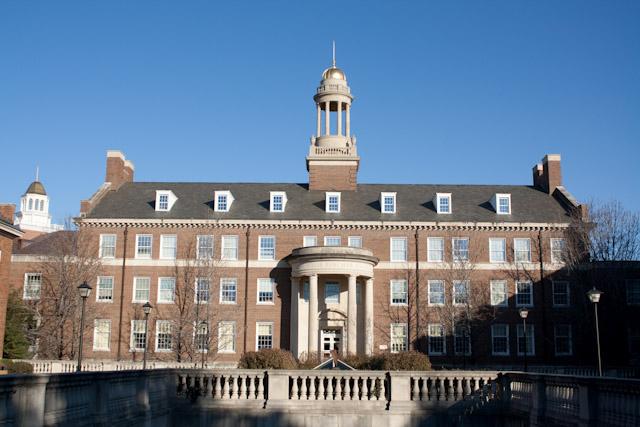
Cox School of Business moved up in the rankings by Bloomberg Businessweek. (MUSTAFA IDRIS/The Daily Campus)
SMU’s Cox School of Business improved its international and national MBA ranking from 2010 to 2011, according to the Financial Times’ Global MBA Rankings that were released last week.
In 2010, Cox was ranked 96 globally and 56 in the United States. In 2011, Cox was ranked 88 globally and in the top 50 in the United States (48).
However, in both 2010 and 2011 Cox ranked lower than the business schools at the University of Texas at Austin, Texas A&M and Rice University.
According to professor Gregory Sommers, who has been at SMU for nine years, it is a long and difficult process for schools to increase in ranking.
“Changing the rankings is a very slow process because it takes time for the word to get out,” Sommers said. “I recently saw one survey where a particular school had been in the top three since 1995.”
Ranked by alumni and students, schools must have had a fulltime MBA program for four years and its first graduating class must have graduated at least three years ago. The AACSB International, Equis or the Association of MBAs must accredit European and U.S. schools.
Rankings categorized in three parts: Alumni salaries and career development, the diversity and international reach of the school and its MBA and the research capabilities of each school.
The 2011 MBA survey amounts for 50 percent of the total weight of the school, while information from the 2010 and 2009 surveys amount for 25 percent each.
While many SMU business students realize that Cox is one of the top business schools, many said the improvement in rankings does not affect them currently, but will help in the future.
“As of right now the actual rankings haven’t really come into play,” junior business major Jordan Kragen said. “It will begin to help me more with job searches.”
Katherine Rose, also a business major, said, “I believe it adds weight to my degree that I am working towards. Recruiters and business men and women know that we are getting a great education and are willing to work, and we have an amazing alumni network.”
Although SMU is still ranked lower than other schools in Texas, Sommers believes the students are getting better each year.
“The student quality has gone up significantly,” he said. “Today’s students are capable of mastering material rather than just scratching the surface. It makes it exciting to teach.”
Thus, instead of focusing on grades, many Cox professors try to instill skills that will benefit students in the work environment.
“I’m trying to lead students to an understanding that college is not a ‘certification process’ and is both intellectual development and knowledge acquisition,” professor Andrew Poehlman said. “I think by trying to get students to think about the world they live in beyond a very simple ‘if x, do y’ approach, students can take advantage of the intellectual environment fostered by a University.”
Professor Barry Bryan agrees.
“My classes are designed such that the students are presented a variety of material that is based upon the audit methodology of large accounting firms,” he said. “By structuring my classes around this methodology, I believe that I am giving the students the opportunity to be presented with issues that they will [be] faced with in public practice.”
Both Rose and Kragen are working toward their BBA degrees from Cox but plan on getting their MBAs a few years after graduation.
As of now, SMU is an option for Rose, who wants some work experience before going back to school for her MBA.
“I plan on applying to SMU and would be happy to get my MBA there,” Rose said.
Since 1920, the SMU Cox School of Business has equipped students with the skills, knowledge and experience they need to succeed in business. Major publications like Forbes and BusinessWeek rank SMU Cox among the top business schools in the nation and around the world.








